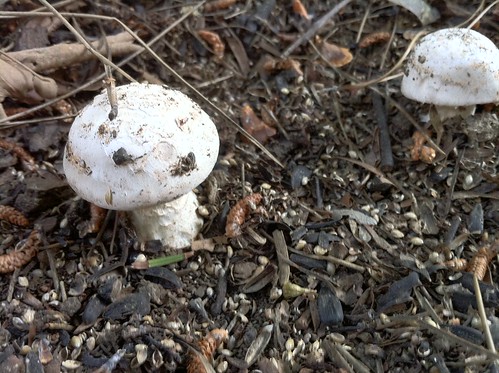
This Garden Vocabulary series seeks to introduce and explain to you — and in many cases, myself — words and terms associated with gardening. Please let me know if there are any terms you would like me to explore. You can leave your ideas in the comments section and we can learn together!
Fungus
A fungus (pron.: /ˈfʌŋɡəs/; plural: fungi[3] or funguses[4]) is a member of a large group of eukaryotic organisms that includes microorganisms such as yeasts and molds (British English: moulds), as well as the more familiar mushrooms. These organisms are classified as a kingdom, Fungi, which is separate from plants, animals, and bacteria.
Abundant worldwide, most fungi are inconspicuous because of the small size of their structures, and their cryptic lifestyles in soil, on dead matter, and as symbionts of plants, animals, or other fungi. They may become noticeable when fruiting, either as mushrooms or molds. Fungi perform an essential role in the decomposition of organic matter and have fundamental roles in nutrient cycling and exchange.
Read the entire article on Wikipedia, Fungus, http://en.wikipedia.org/wiki/Fungus
As it’s own Kingdom, the world of fungus is huge, diverse and largely unknown to most people. Sure, we see mushrooms and toadstools in our gardens when it gets wet, fairy rings around dead or dying trees or perhaps even go looking for the more tasty (and less deadly) varieties. Still, what we see above the soil is often the smallest part of the fungi, although the most visible.
I am not a fan of eating fungi, but I love the way that many of the fungus look. The shell-like structure growing on dead trees often catch my eye when walking through the woods, as do the small mushrooms, like the one below, that sometimes pop up in my garden.
As a gardener, I have heard much about mycorrhizal fungi which is now being used to aid transplants in establishing strong roots. In many gardening shows you can see gardeners scattering it on the roots of a shrub or tree they are planting. From my limited understanding, the mycorrhizal fungi breaks down important nutrients in the soil and makes it available for the roots, which can gather it up more quickly and easily. Gardeners can now purchase the fungi for use in their own gardens.
You could, and many people do, make a life and career out of studying fungus and with such a variety to choose from to study, it only makes sense.

Possible Agaricus campestris(?) in my garden
More information on fungus:
Previously on Garden Vocabulary:




